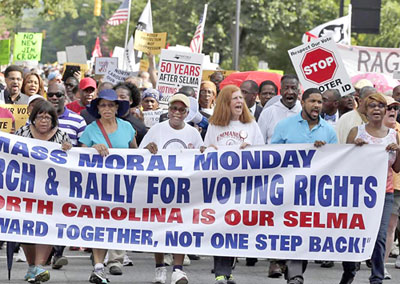
Vol. 80/No. 33 September 5, 2016
(front page)
Socialist Workers Party says, ‘Fight to defend right to vote’
Struggle over right to vote in US continues today

In June 2013 the U.S. Supreme Court struck down a key part of the 1965 Voting Rights Act, won in blood in the mass Black rights struggle that overthrew Jim Crow segregation. The justices ruled that forcing states and regions with a history of voter suppression to obtain federal “preclearance” before changing voting laws is unnecessary.
“The conditions that originally justified these measures no longer characterize voting in the covered jurisdictions,” Chief Justice John Roberts wrote.
It is true that deep changes have been wrought in the social outlook of working people in the South, reflected in the widespread support for the removal of the Confederate Battle Flag from the Capitol in South Carolina last year. But the ruling families and racist officials in many places previously covered by the Voting Rights Act immediately took advantage of the court ruling to ram through new restrictions in the name of preventing much trumpeted but rarely existing cases of “voter fraud.”
Within hours of the decision, Texas officials said they would enforce a voter ID law previously blocked for disenfranchising Blacks and Latinos. In Mississippi and Alabama state officials moved to enforce ID laws that were awaiting preclearance.
The North Carolina legislature passed a sweeping law restricting access to voting, ending voter registration on the day of the election, limiting early voting and imposing a strict photo ID requirement.
Similar laws were passed in Tennessee and elsewhere in the South, as well as in Wisconsin, Michigan, Kansas and North Dakota, many in states where the Republican Party controlled the government.
Workers who are convicted on felony charges permanently lose their right to vote in 10 states. They must wait until they serve out all probation or parole to apply to vote in 24 additional states and often face arbitrary restrictions.
In Tennessee, one of the most restrictive states, persons convicted of a felony since 1981 may apply for restoration of suffrage after completing their sentence, if they have paid all outstanding court-ordered restitution or child support.
These attacks have met with resistance. Voting rights was a key demand in the march of 80,000 in March 2015 commemorating the hard fought 1965 Selma-to-Montgomery civil rights protests.
The North Carolina NAACP has organized dozens of voting rights protests across the state in recent years. Thousands marched July 13, 2015, in Winston-Salem at the start of a federal trial challenging new state restrictions.
Voting rights was the theme of the NAACP’s Aug. 1-Sept. 16, 2015, 1,000-mile Journey for Justice march from Selma, Alabama, to Washington, D.C.
The protests have had an impact.
The 5th District Court of Appeals ruled July 20 that the Texas voter ID law “has a discriminatory effect on minorities’ voting rights.”
The North Carolina law was declared unconstitutional July 29 by the 4th Circuit Court of Appeals. Its provisions “target African Americans with almost surgical precision,” wrote Judge Diana Gribbon Motz. The same day voting restrictions in Wisconsin were voided by a federal district court.
But many obstacles remain, especially at local levels. In March, the City Council in Daphne, Alabama, reduced the number of polling places from five in neighborhoods where Caucasians and African-Americans live to just two in majority-Caucasian areas.
In January, after the St. Louis County government placed 18 polling places inside police stations, the NAACP demanded they be moved. Voting in a cop station “is far too similar to an unofficial Jim Crow law” in a county whose population is 24 percent African-American, Esther Haywood, St. Louis County NAACP president, told the St. Louis American.
And in Sparta, Georgia, residents protested and filed a lawsuit after the Hancock County Board of Elections and Registration sent sheriff’s deputies to the homes of more than 180 Black citizens ordering them to appear in person with proof of residence or lose their right to vote.
Related articles:
SWP campaign confronts Tenn. curbs on voting rights
Working-class fight for right to vote marks US history
‘Our priority is one-on-one discussions with workers’
Join the Socialist Workers Party campaign!
Front page (for this issue) | Home | Text-version home